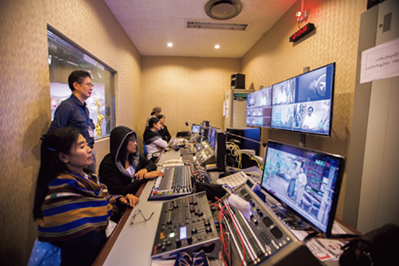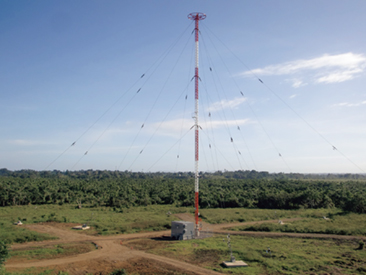(3) Assistance for Democratization
It is a critical component of encouraging medium- to long-term stability and development in developing countries to strengthen the foundation for democracy such as by the people's participation in governance and development and by protecting and promoting human rights. In particular, based on the perspective of the principles of the Development Cooperation Charter, it is important that Japan actively assists developing countries which take proactive steps towards democratization and supports their efforts to shift to democratic systems that include electoral assistance.
<Japan's Efforts>
At the Japan-Cambodia Summit Meeting held in 2013, Prime Minister Hun Sen requested for electoral reform assistance to Prime Minister Abe. In response to this request, Japan has provided support for electoral reform in the following aspects: (i) provision of technical advice; (ii) dispatch of experts; and (iii) supply of equipment as well as assistance such as updating electoral lists and providing voter education provided mainly by Japan and the EU. These efforts resulted in enhancing voters' trust in the electoral process, contributing to smooth local election processes in June 2017.
With respect to Timor-Leste, Japan signed the “Project for Electoral Assistance for Social Inclusion, Multi-Tier Governance and Strengthening of Rule of Law (in cooperation with UNDP)” with UNDP in 2016 and provided training, technology support, and equipment to electoral management bodies, journalism, the judiciary, and police for the democratic and peaceful implementation of elections in the country, including the presidential election and National Parliament elections held in 2017.
For the Kyrgyz Republic, Japan signed a grant aid for the “Project for Supporting the Unified State Population Registry to Establish the E-Government System (in cooperation with UNDP),” through which Japan would provide ¥649 million to assist in the building of a unified registration system across the country that would serve as the basis for an E-Government system as well as fair elections operations. The assistance include the issuance of ID cards and passports embedded with biometric authentication data for personal identification purposes, and the provision of ICT equipment and dedicated vehicles mounted with the equipment required for efficient gathering of information in remote areas. During the presidential elections held in October 2017, the equipment supplied was utilized effectively to prevent unjust practices such as multiple voting and pretense, resulting in a peaceful election without any major disturbances or disorder.
In September 2017, Japan implemented the grant aid project, “Support to Electoral Security (in cooperation with UNDP),” through which it will provide ¥128 million to Liberia to assist in strengthening the security maintenance systems for the country's national police force, with the aim of realizing fair and just elections for President and the House of Representatives of Liberia.
Apart from these, in view of the general elections scheduled to be held in Pakistan in 2018, Japan also signed the Exchange of Note with UNDP in November 2017 to provide ¥639 million towards the “Project for Electoral Assistance.” Through this project, Japan provides support to improve the capacity of Pakistan's government in the area of electoral processes, so as to ensure that elections are carried out freely, fairly, and smoothly.
These types of assistance are expected to contribute to the recipient countries' ability to hold smooth elections in a fair and transparent manner, and to consolidating peace and democracy in the recipient countries, along with bringing about peace and stability in the international community.
•Media Assistance

A JICA expert, Mr. Jusaburo Hayashi, checking staff operations in the operations room of a recording studio of the state-owned broadcasting station in Myanmar (Photo: Shinichi Kuno / JICA)
In many cases, the media is utilized for political purposes in countries affected by conflict around the world. A major challenge in conflict prevention is the development of an impartial, neutral, and accurate media that is not utilized by politicians.
The “Project for Electoral Assistance” to Pakistan that Japan signed the Exchange of Note for in November 2017, as described above, offers assistance for capacity building for those in the media sector through various training programs on elections processes and electoral reporting. The objective is to ensure balanced, neutral, and objective media coverage for elections, as well as to enable peaceful and democratic discussions.
•Fiji
The Project for the Rehabilitation of the Medium Wave Radio Transmission
Grant aid (August 2015 - August 2017)
The Project for the Rehabilitation of the Medium Wave Radio Transmission is the first official grant aid from Japan to Fiji since the democratic government was restored through the election in September 2014 with interval of eight years. The project aims to expand the broadcasting range of medium wave radio as well as to stabilize and improve the quality of broadcasting through developing a medium wave antenna, MF transmitter and transmitter building of the Fiji Broadcasting Corporation (FBC), thereby ensuring accurate and rapid delivery of information such as disaster information to the people of Fiji.
Fiji has a population of around 900,000 spread out over 330 islands. In Fiji, people rely on radio broadcasting for obtaining important information including news, weather, and school related information. As a country prone to natural disasters such as cyclones, radio broadcasting is especially important for people to receive disaster information in a timely and accurate manner.

An antenna for medium wave radio broadcasting (Photo: JICA)
Currently, medium wave radio broadcasts (AM radio) are provided by FBC. However, the transmitter has been deteriorating over the years since its first installation in 2000, and has frequently malfunctioned. While broadcasting services have been continued through FM radio, the receptible area is smaller than the range of a medium wave, which means disaster information may not reach remote islands. Therefore, an early recovery of medium wave radio broadcasting was required. In addition, the Government of Fiji has listed information and telecommunication, disaster risk reduction, etc. as important items in policy making in the Roadmap for Democracy and Sustainable Socio-Economic Development 2010-2014. Based on the emphasis on improving people's access to information and disaster response capability among communities, this project is expected to contribute to providing accurate and rapid disaster information.
This project is going to enable all of Fiji and its seas, except for Rotuma, to receive radio broadcasts, and non-broadcasting hours will be cut down from the average of 100 hours a year to 8 hours.
